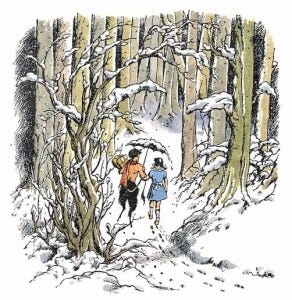Piranesi by Susanna Clarke
Piranesi was published on September 15, 2020 by Bloomsbury.

Review Part One
This much is obvious to anyone who has read Jonathan Strange & Mr Norrell, a book so full of imaginative magical history that it makes one wish it could go on forever:
Susanna Clarke, like me, is fascinated with magicians.
Not so much, it seems, with magic itself, the power (although power is an important aspect of the magician as it is the power the magician holds that defines him), but with the wielding of power, the person behind it, the corruption of it, his shadow, and the splendour.
She opens her second novel, Piranesi, with two quotes, both of which are about magicians and, as is apt for the book’s opening, are the key to unlocking many of its hidden meanings, inspirations, and in a way, even its story. There could not be a more perfect introduction to the world of Piranesi.
Just as Clarke, in her Jonathan Strange & Mr Norrell, makes an important distinction between books about magic and books of magic, I too believe there to be a distinction between fantasy books and books about fantasy, with the latter exploring such themes as suffuse the former. They are an inquiry into the nature of fantasy, its beauty, and our relationship with it.
I’ve already talked about one such work in 2021, The Magicians, and I see Piranesi as a treatise that adds to the same larger opus of work, one that has been contributed to by the likes of C. S. Lewis himself with his The Chronicles of Narnia (and this is where the first of those opening quotes actually comes from). Together, I believe, they form a course in the curriculum of fantasy, they add to the same important genealogy of ideas.
This alone, to me, makes Piranesi immensely important. Even more so, perhaps, than Clarke’s previous work. For as much as that is a masterpiece in its own right, Piranesi connects on a more personal level, one that has behind it the hallmarks of our own time. Here, the magicians are closer to you and me, the darkness all the more real.
Review Part Two
Piranesi, as our main character is named by his one and only friend (the name itself is a hint), is a person who lives in the House, and we read the story as it is written from his point of view. Piranesi is a meticulous note-taker, and in his journals, he keeps lists, calculations, and entries on everything that exists in the House. He even has one journal reserved especially for indices.
In many ways, language itself is one of the characters in this book. The language Piranesi uses in his writing, that is. It is the filter through which we observe the world, and it influences the story as much as any other character, or even the House itself.
Piranesi has always lived in the House, it is his entire world, and it is vast. In his own words “The Beauty of the House in immeasurable, its Kindness infinite”, and he describes it in the most wonderful and delightful ways.
The entire time I spent reading this book, I was bursting with desire to read it aloud to someone. Many times, near the book’s beginning, I had to interrupt my wife in whatever it is that she was doing at that moment and read her a full page or two of Piranesi, grinning with delight and joy as I read her the descriptions of the various aspects of the House.
And the House is astonishing. It has countless halls, hallways, and vestibules sprawling in all directions, all of them filled with tiers upon tiers of statues lining the walls. Halls of the lower floors are flooded with the ocean, whose tides sometimes reach and even flood the upper halls, and there are halls so high up that they are home to an endless procession of clouds.
The statues in the House are all different, and they all tell a story. These little nuggets of stories are representative of Clarke’s charming writing. To demonstrate this, I will tell you about one statue in particular. It is the statue of a faun, and it is Piranesi’s favourite statue. The faun smiles and presses a finger to his lips in a warning. Piranesi “dreamt of him once; he was standing in a snowy forest and speaking to a female child.” *Wink wink*
I hope that brought some joy to you.






